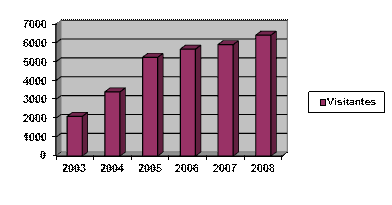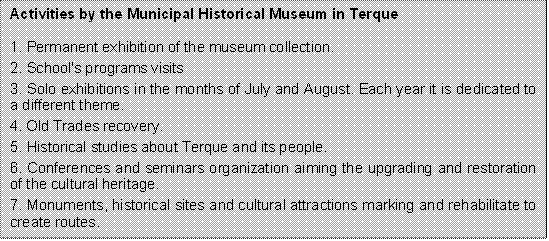






|

|

|

|

|

|
This case is an example of an initially private initiative that, combined with public support, achieves sustainability and regional relevance. It started in 2002 when the private association of friends for Terque's museum and the Town Council of Terque made a serious commitment to recover and preserve the ethnographic heritage through its museums: the Historical and Ethnographic Museum, and a monographic museum about the export of grapes that was base for the local economy in the first part of the 20th century.
This initiative is promoting Terque's municipality as a „village of museums”. The village has managed to become a tourism destination not only for the province of Almería, but also attracts increasing numbers of visitors from cities in the surrounding provinces of Granada and Murcia. Due to this success, recently a small company was created which employs touristic guides to escort service in museums and monumental sights.
The visitors’ influx is close to 6000 people per year in a municipality of 456 inhabitants. They come mainly from provincial colleges and schools, and groups of elderly people and families. It generates a significant flow of daily visitors. Recently, an autonomous one-person company has been created. This person acts as a sightseeing guide for the museums and the village. Some visitors stay in the area to relax, and add the museums visit as a complement to the leisure offers in the area. The promotion has been done in provincial, regional and national media. Moreover, it has published regular monthly newsletters since its creation.
Now (beginning 2011), the initial initiative of just a couple of individuals has developed into a small „museum village” that includes three different thematic exhibitions:
Historical and Ethnographic Museum
It is located in one of the many bourgeois houses built in the late nineteenth century. It is the local Council's property. This museum is dedicated to the conservation, research and dissemination of Terque's and the province of Almería ethnographic heritage.
The museum is divided into two floors. The trades, the domestic setting and religious events, social and political history of Terque and its region are described. At the present moment, two research studies are performed. One of them focuses on the photographic heritage and the other one - on the recovery of personal documents.
The Historical and Ethnographic Museum has obtained provisional registration in the Andalusian Network of Museums.
The Provincial Museum of Export Table Grapes
 These
grapes, also locally knows as „uva de embarque” („grape for shipping”),
have a very strong consistence with hard skin and can last long periods without
artificial cooling, being ideal for export to northern Europe when no refrigerator
ships existed. This museum is dedicated to preserve the „parralera”
cultural identity that came along with this product in the province of Almeria.
At the same time, it helps to reconstruct the social and economic history of Almeria
province, which for almost two centuries was based on the extraction and exportation
of minerals and the cultivation and marketing of these table grapes. The collection
has been donated and documented in all villages of the province related with grapes
culture. It has been possible thanks to the generosity of many people involved in
this activity. It was opened in 2006 and it is located temporarily in the multipurpose
room of the Teatro Manuel Galiana Terque.
These
grapes, also locally knows as „uva de embarque” („grape for shipping”),
have a very strong consistence with hard skin and can last long periods without
artificial cooling, being ideal for export to northern Europe when no refrigerator
ships existed. This museum is dedicated to preserve the „parralera”
cultural identity that came along with this product in the province of Almeria.
At the same time, it helps to reconstruct the social and economic history of Almeria
province, which for almost two centuries was based on the extraction and exportation
of minerals and the cultivation and marketing of these table grapes. The collection
has been donated and documented in all villages of the province related with grapes
culture. It has been possible thanks to the generosity of many people involved in
this activity. It was opened in 2006 and it is located temporarily in the multipurpose
room of the Teatro Manuel Galiana Terque.
History
The Ethnographic Museum was founded in 2002 by the initiative of several local citizens. They created the association „Friends of the Museum”, which soon received the support of other residents and of the Town Hall.
The origin of the museum is connected with the preparation of a temporary exhibition by the association and locals about some aspects of the history of the village of Terque in 2001. The subjects were emigration, military service, the History of Education and Children in Terque. Once this event was in course, the idea appeared to maintain the exhibition over time, not just for this occasion, creating the Ethnographic Museum that used the collected materials for a start, but since then has considerably extended the available items and documents.
Management
 Terque's
Museums are managed in collaboration with the local council and a voluntary association:
Association Amigos del Museo de Terque whose president is also the director of the
museums. At the beginning it was not financed. The local council only provided a
building with exhibition space that was expanded as more pieces were added to the
collection.
Terque's
Museums are managed in collaboration with the local council and a voluntary association:
Association Amigos del Museo de Terque whose president is also the director of the
museums. At the beginning it was not financed. The local council only provided a
building with exhibition space that was expanded as more pieces were added to the
collection.
 After
its creation, financial support has been received from institutions such as the
RDG Alpujarra, the Instituto de Estudios Almerienses, the Culture area of the Diputación
Provincial in Almería, the Ministry of Culture of the Junta de Andalucía.
These funds were dedicated entirely to improve facilities, publications and organizing
activities. It also has the support of private institutions such as the Mediterranean
Environmental Group.
After
its creation, financial support has been received from institutions such as the
RDG Alpujarra, the Instituto de Estudios Almerienses, the Culture area of the Diputación
Provincial in Almería, the Ministry of Culture of the Junta de Andalucía.
These funds were dedicated entirely to improve facilities, publications and organizing
activities. It also has the support of private institutions such as the Mediterranean
Environmental Group.

The Association is receiving financial compensation from the Diputación of Almería for the work of organizing exhibitions and giving conferences in the province of Almería (more than 50 municipalities have been covered so far). This money is used entirely for publications like the monthly bulletin or monographs about various ethnographic topics, and for some other related topics (see below).
The City Council is responsible for the maintenance and cleaning, as well as the museum's expenses. The association's members are volunteers. The association owns all the collections and handles different activities such as the opening at weekend and related to the research department the following topics are treated: cataloguing, preservation, assemblies inside and outside the museum, publications, press releases and the reception of new pieces.
Activities
The museums in Terque are developing various activities inside and outside the municipality. Many of their activities have a provincial character. They are promoted through the monthly Bulletin and press releases. The museum's presence can be noticed in printed materials, on radio or on television at least monthly.

|
The action of cultural promotion of Terque's museums reaches across the province and into limiting areas of Granada and Murcia. The most important activities include:
Historical Varieties of Table Grapes Recovery Programme in Almería
 The
Provincial Museum of table grapes in Terque, Terque Town Council, and the Provincial
Council of Almeria are working together on a project to conserve the historic varieties
of table grapes in the province of Almeria.
The
Provincial Museum of table grapes in Terque, Terque Town Council, and the Provincial
Council of Almeria are working together on a project to conserve the historic varieties
of table grapes in the province of Almeria.
For this purpose a vineyard has been planted. Its objectives are as follows:
Each September, a sample of table grape varieties is presented in the Patio de Luces of the Almeria Province Council in order to demand the preservation of our ancient grapes varieties, and to honour those parraleros who are retaining the old varieties in the province.

|
Section 3.5: Case Studies | 3.5.2. Country House "Cortijo Relente" |

|